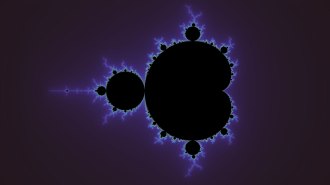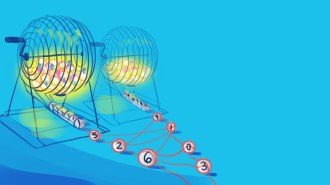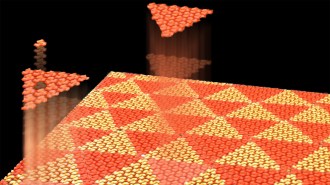Still debating with Plato
Where do mathematical objects live?
- More than 2 years ago
Think too hard about it, and mathematics starts to seem like
a mighty queer business. For example, are new mathematical truths discovered or
invented? Seems like a simple enough question, but for millennia, it has
provided fodder for arguments among mathematicians and philosophers.
Those who espouse discovery note that mathematical
statements are true or false regardless of personal beliefs, suggesting that
they have some external reality. But this leads to some odd notions. Where, exactly, do these mathematical
truths exist? Can a mathematical truth really exist before anyone has ever
imagined it?
On the other hand, if math is invented, then why can’t a mathematician legitimately invent that 2 + 2 = 5?
Many mathematicians simply set nettlesome questions like these aside and get back to the more pleasant business of proving theorems. But still, the questions niggle and nag, and every so often, they rise to attention. Several mathematicians will ponder the question of whether math is invented or discovered in the June European Mathematical Society Newsletter.
Plato is the standard-bearer for the believers in discovery. The Platonic notion is that mathematics is the imperturbable structure that underlies the very architecture of the universe. By following the internal logic of mathematics, a mathematician discovers timeless truths independent of human observation and free of the transient nature of physical reality. “The abstract realm in which a mathematician works is by dint of prolonged intimacy more concrete to him than the chair he happens to sit on,” says Ulf Persson of Chalmers University of Technology in Sweden, a self-described Platonist.
The Platonic perspective fits well with an aspect of the experience of doing mathematics, says Barry Mazur, a mathematician at Harvard University, though he doesn’t go so far as to describe himself as a Platonist. The sensation of working on a theorem, he says, can be like being “a hunter and gatherer of mathematical concepts.”
But where are those hunting grounds? If the mathematical ideas are out there, waiting to be found, then somehow a purely abstract notion has to have existence even when no human being has ever conceived of it. Because of this, Mazur describes the Platonic view as “a full-fledged theistic position.” It doesn’t require a God in any traditional sense, but it does require “structures of pure idea and pure being,” he says. Defending such a position requires “abandoning the arsenal of rationality and relying on the resources of the prophets.”
Indeed, Brian Davies, a mathematician at King’s College London, writes that Platonism “has more in common with mystical religions than with modern science.” And modern science, he believes, provides evidence to show that the Platonic view is just plain wrong. He titled his article “Let Platonism Die.”
If mathematics is the perception of this realm of pure ideas, then doing mathematics requires our brains to somehow reach beyond the physical world. Davies argues that brain-imaging studies are making this belief steadily less plausible. He points out that our brains integrate many different aspects of visual perception with memory and preconceptions to create a single image — not always correctly, as optical illusions make clear. He also says that brain-imaging studies are beginning to show the biological basis of our numeric sense.
But Reuben Hersh of the University of New Mexico isn’t convinced that studies like these logically destroy the Platonic notion of an intuitive faculty to perceive mathematics. Nevertheless, he rejects the Platonic view, arguing instead that mathematics is a product of human culture, not fundamentally different from other human creations like music or law or money.
The challenge, he admits, is to explain why it is that mathematical statements can be definitively true or false, not subject to taste or whim. With simple statements like “2 + 2 = 4,” this is because of the connection between mathematics and physics, he says. Such a statement describes, for example, the way that coins or buttons behave. For more abstract statements that are further removed from the physical world, he points to the structure of our brains and our penchant for logic.
But Mazur finds that explanation unsatisfying. “We should keep an eye on the stealth word ‘our,’” he writes. “Is the we meant to be each and every one of us, given our separate and perhaps differing and often faulty faculties?” In this case, mathematics itself has to vary as individuals do.
On the other hand, if “we” means a kind of abstraction of our individual capabilities — the common thing that binds us together without actually being any of us — he says that we are verging back toward the Platonic notion of a realm of abstract ideas.
But the notion of invention also captures something true about the experience of doing mathematics, in his view. “At times,” he says, “I seem to be engaged in an analysis of my thought processes or other people’s thought processes while doing mathematics.” All aspects of these experiences, he argues, need to be included in these discussions.
“One thing is — I believe — incontestable,” he writes. “If you engage in mathematics long enough, you bump into The Question, and it won’t just go away. If we wish to pay homage to the passionate felt experience that makes it so wonderful to think mathematics, we had better pay attention to it.”
References:
Mazur, B. 2008. Mathematical Platonism and its Opposites. European Mathematical Society Newsletter (June). http://www.ems-ph.org/journals/journal.php?jrn=news.
Persson, U. 2008. On Platonism. European Mathematical Society Newsletter (June). http://www.math.chalmers.se/Platonism/platonism.pdf.
Davies, E.B. 2007. Let Platonism Die. European Mathematical Society Newsletter (June). http://www.ems-ph.org/journals/newsletter/pdf/2007-06-64.pdf.






